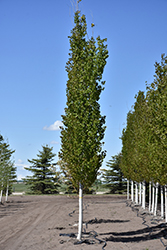It's all about ...
plants

Forest Silver Aspen
Populus tremuloides 'Forest Silver'
Height: 35 feet
Spread: 20 feet
Sunlight:
![]()
Hardiness Zone: 2b
Other Names: Trembling Aspen, Quaking Aspen
Description:
This variety is upright and columnar, with ascending branches that are tight to the central leader; round leaves flutter in the slightest breeze, and turn bright yellow-gold in the fall; an impressive landscape accent
Ornamental Features
Forest Silver Aspen is primarily valued in the landscape for its rigidly columnar form. It has rich green deciduous foliage. The round leaves turn outstanding shades of yellow and gold in the fall. However, the fruit can be messy in the landscape and may require occasional clean-up. The smooth white bark adds an interesting dimension to the landscape.
Landscape Attributes
Forest Silver Aspen is a deciduous tree with a strong central leader and a narrowly upright and columnar growth habit. Its average texture blends into the landscape, but can be balanced by one or two finer or coarser trees or shrubs for an effective composition.
This tree will require occasional maintenance and upkeep, and is best pruned in late winter once the threat of extreme cold has passed. It has no significant negative characteristics.
Forest Silver Aspen is recommended for the following landscape applications;
- Accent
- Vertical Accent
Planting & Growing
Forest Silver Aspen will grow to be about 35 feet tall at maturity, with a spread of 20 feet. It has a low canopy with a typical clearance of 2 feet from the ground, and should not be planted underneath power lines. It grows at a fast rate, and under ideal conditions can be expected to live for 50 years or more.
This tree should only be grown in full sunlight. It is an amazingly adaptable plant, tolerating both dry conditions and even some standing water. It is considered to be drought-tolerant, and thus makes an ideal choice for xeriscaping or the moisture-conserving landscape. It is not particular as to soil type or pH. It is somewhat tolerant of urban pollution. This is a selection of a native North American species.
